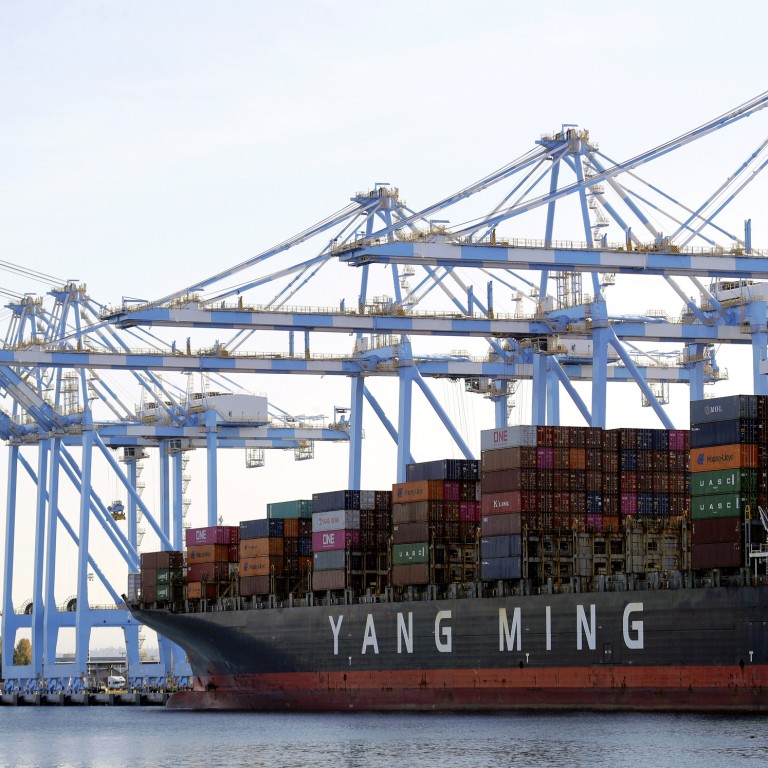
US-Taiwan trade deal seen speeding up Taiwan’s shipping and boosting start-ups; Beijing quiet so far
- Initiative also lays the foundation for negotiations of a free-trade agreement between Washington and Taipei, according to the island’s premier
- Speedier inspections and clearances will be beneficial for trade in goods with a shelf life, as they will be cleared from US ports faster
The just-signed first phase of a trade initiative between Taiwan and the United States should make the shipping of exports faster and more transparent, though it risks an eventual backlash from Beijing, analysts say.
Taiwanese Premier Chen Chien-jen called the deal “fruitful and historic”.
Exporters on the island should anticipate shorter delays at US customs ports in shipping goods with a set shelf life, said Darson Chiu, a research fellow with the Taiwan Institute of Economic Research in Taipei.
Could a Taiwan tax deal help US ‘cripple’ China’s semiconductor development?
Sometimes those shipments must wait months for clearance, pushing against their expiration dates, he said. “The costs of trade will come down because of less time in customs,” he said.
The two parties will allow each other’s shippers to file import-related documents electronically and inspect shipments at ports within “reasonable hours”, the agreement text says.
Speedier customs clearances will particularly help with imports of certain plastics or fibres, such as polystyrene pellets for bottles, said Danny Ho, chief executive of the DMI energy consulting firm in Taiwan.
Those goods belong to a category of plastics and rubber exports that was worth US$64.23 million in the first four months of 2023.
The agreement text adds that US and Taiwanese officials may “periodically” hold dialogues on issues related to small and mid-sized companies when both sides feel the exercise is “useful”.
Official dialogue to support smaller companies is likely to mean more government-funded incentives, subsidies and events for start-ups, said Lin Ta-han, creator of the Taipei-based crowdfunding consulting company Backer-Founder.
“According to this framework, the governments must come up with more resources for start-ups,” Lin said.
The current deal also calls for identifying potential overlaps in regulations.
But Taiwan may need to rewrite “a lot of its own rules” to honour the agreement’s clauses on the transparency of trade documentation, said Huang Kwei-bo, an associate professor of diplomacy at National Chengchi University in Taipei.
An anti-corruption clause in the deal’s first phase forbids “the making of off-the-books or inadequately identified transactions”.
A spotlight was cast on transparency in 2016, when a US branch of Taiwan-based Mega Financial was fined for compliance and anti-money-laundering violations.
Taiwan officials urge US to calm rhetoric about chip dangers, Chinese invasion
Looking ahead, the premier said, Taiwan and the US have established with this deal an “important infrastructure” for negotiating a free-trade agreement.
The initiative now in progress is seen as a lighter version of a traditional free-trade deal, as the negotiators do not plan to drop import tariffs, nor does the US Congress need to give special approval. Conventional free-trade agreements normally cut tariffs and liberalise market access.
Future negotiations are expected to cover “digital” trade, the agricultural sector, and the removal of double taxation.
Mainland Chinese officials were not available for comment on Friday but are expected to be closely monitoring the deal-making process.
Beijing, being used to high-level US-Taiwan talks, may keep quiet to monitor future phases of the trade talks, Huang said. Later agreements that more closely resemble a “traditional” free-trade agreement would raise some hackles on the mainland, Huang said.
“Then they would get a pre-emptive warning from Beijing,” he said.
Beijing views self-ruled Taiwan as part of China to be unified, by force if necessary.
Nations that have diplomatic ties with Beijing, including the US, acknowledge the existence of the one-China principle stating that Taiwan is part of China, but they may not explicitly agree with it.
Still, Washington is interested in signing an agreement that drops tariffs on imports from Taiwan, said Chiu with the Taiwan Institute of Economic Research. Taiwan is running a US$30 billion trade surplus with the US, on US$75 billion worth of total exports logged last year.

